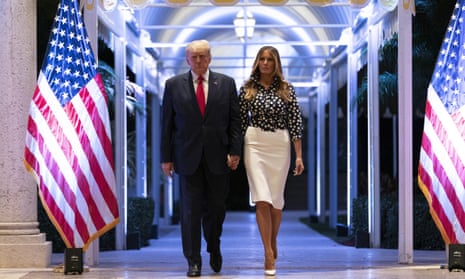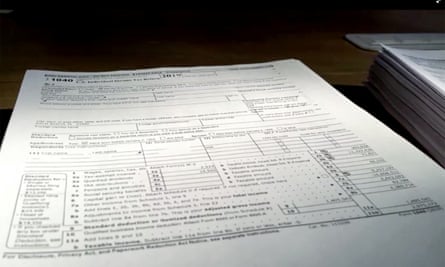Returns date from 2015 to 2020 and span nearly 6,000 pages as former president rails against effort by ‘radical left Democrats’

Six years of Donald Trump’s tax returns were made public by a congressional committee on Friday, ending the former president’s long-running effort to break precedent and keep them secret.
The documents, dating from 2015 to 2020, offer insights into the complex finances and foreign bank accounts of a man who was accused of abusing the presidency for personal profit and who has already announced another bid for the White House.
A House of Representatives report released earlier this month analyzed the documents and showed Trump and his wife Melania paid no federal income tax in 2020, the last full year he was in office.
The couple paid $641,931 in federal income taxes in 2015, the year Trump began his campaign for president. They paid $750 in 2016 and 2017, nearly $1m in 2018, $133,445 in 2019 and $0 in 2020, the year Trump unsuccessfully sought re-election.
Such numbers reflect heavy business losses and undermine Trump’s self-perpetuated narrative of commercial wealth and success – a crucial part of his brand during his successful 2016 campaign.
Trump reported bank accounts in Britain, China and Ireland from 2015 to 2017, and from 2018 only reported a bank account in Britain.
During a presidential debate in 2020, Trump said the Chinese account “was closed in 2015, I believe” and insisted: “I closed it before I even ran for president, let alone became president.”
Responding to the release on Friday, Daniel Goldman, a congressman-elect from New York who was counsel to House Democrats in Trump’s first impeachment, said: “Generally, you only have bank accounts in a foreign country if you are doing transactions in that country’s currency. What business was Trump doing in China while he was president?”
The returns also show Trump claimed foreign tax credits for taxes paid on business ventures around the world, including licensing arrangements for the use of his name on development projects and his golf courses in Scotland and Ireland.
During his first three years in office, Trump apparently fulfilled his campaign promise to give his salary to charity. But in 2020, he reported $0 in charitable giving.
The returns span nearly 6,000 pages, including more than 2,700 pages of individual returns from Trump and Melania and more than 3,000 pages from Trump’s businesses. Sensitive information such as social security and bank account numbers have been redacted.

Trump responded angrily to their release, saying in a statement: “The Democrats should have never done it, the supreme court should have never approved it, and it’s going to lead to horrible things for so many people. The great USA divide will now grow far worse. The Radical Left Democrats have weaponized everything, but remember, that is a dangerous two-way street!”
Defending his business record, he added: “The ‘Trump’ tax returns once again show how proudly successful I have been and how I have been able to use depreciation and various other tax deductions as an incentive for creating thousands of jobs and magnificent structures and enterprises.”
The congressional report published last week also found that the Internal Revenue Service (IRS) failed to conduct mandatory audits of Trump in his first two years in office. By contrast, there were audits of Joe Biden for the 2020 and 2021 tax years, according to the White House.
Richard Neal, the Democratic chairman of the ways and means committee, said in a statement on Friday: “A president is no ordinary taxpayer. They hold power and influence unlike any other American. And with great power comes even greater responsibility.
“We anticipated the IRS would expand the mandatory audit program to account for the complex nature of the former president’s financial situation yet found no evidence of that. This is a major failure of the IRS under the prior administration, and certainly not what we had hoped to find.”
Trump’s finances have been shrouded in mystery since the 1980s and his days as a New York property developer. In 2016, he became the first major-party candidate for president in four decades to refuse to release his tax returns. He continued to do so in office.
In 2019, the House ways and means committee, which has the authority to see any taxpayer’s federal returns, requested the documents from the treasury department. The Trump administration refused to provide them, setting off a three-year legal battle. In November, the supreme court ruledthat the committee could access the returns.
Last week, the committee decided in a party-line vote to make the returns public. Democrats argued that transparency and the rule of law were at stake. Republicans said the release would set a dangerous precedent with regard to privacy protections.
Don Beyer, a Virginia Democrat, presided over a pro forma House session on Friday as the returns were released, days before Democrats cede control to Republicans.
Beyer said: “Despite promising to release his tax returns, Donald Trump refused to do so, and abused the power of his office to block basic transparency on his finances and conflicts of interest which no president since Nixon has foregone.
“Trump acted as though he had something to hide, a pattern consistent with the recent conviction of his family business for criminal tax fraud. As the public will now be able to see, Trump used questionable or poorly substantiated deductions and a number of other tax avoidance schemes as justification to pay little or no federal income tax in several of the years examined.”
Kevin Brady of Texas, the ranking Republican, condemned the move, saying: “This is a regrettable stain on the ways and means committee and Congress, and will make American politics even more divisive and disheartening. In the long run, Democrats will come to regret it.”
Trump stalled efforts to put his taxes in the public domain. Running for president in 2016, he promised to release them once he had been audited. But later that year he appeared to take pride in not paying taxes.
During a presidential debate, his Democratic opponent, Hillary Clinton, said: “The only years that anybody’s ever seen were a couple of years when he had to turn them over to state authorities when he was trying to get a casino license, and they showed he didn’t pay any federal income tax.”
Trump replied: “That makes me smart.”
But in 2018 the New York Times reported leaked records that showed Trump received a modern-day equivalent of at least $413m from his father’s property holdings, much of it coming from “tax dodges” in the 1990s.
In 2020 the paper showed Trump paid just $750 in federal income taxes in 2017 and 2018, and no income taxes at all in 10 of 15 years because he generally lost more than he made.
Trump continues to face major scrutiny about his business practices. Earlier this month, a New York jury found the Trump Organization guilty of 17 counts of criminal tax fraud. Though Trump was not part of the trial, prosecutors said he was aware of the off-the-books practices at issue. Lawyers for the Trump Organization blamed Allen Weisselberg, the longtime chief financial officer.
The New York attorney general, Letitia James, is suing Trump for fraudrelated to inflating his net worth. Trump and his company have denied wrongdoing.
